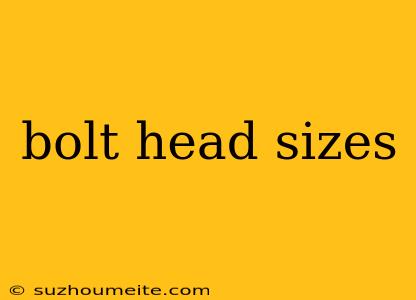Bolt Head Sizes: A Guide to Understanding Different Types
Bolt heads come in various sizes and shapes, each designed for specific applications. Understanding these differences is crucial for selecting the right bolt for your project. This article will guide you through the common types of bolt head sizes and their applications.
Common Bolt Head Sizes
Here are some of the most common bolt head sizes you'll encounter:
- Hex Head: The most widely used type, characterized by its hexagonal shape. This design allows for easy tightening and loosening using a wrench.
- Square Head: Less common than hex heads, but still prevalent in certain applications. These bolts have a square-shaped head that also requires a wrench for manipulation.
- Slotted Head: Features a slotted head that can be turned with a flat-blade screwdriver. These are often found in applications where torque is not a significant factor.
- Phillips Head: Similar to slotted heads, but with a cross-shaped slot for a Phillips screwdriver. This design provides better grip and torque control.
- Torx Head: This type uses a star-shaped opening for a Torx driver. Torx heads offer greater strength and reduced cam-out (the tendency for the driver to slip out of the head).
- Allen Head (Hex Socket): Features a hexagonal opening designed for an Allen wrench. Allen heads offer superior torque control and resistance to wear.
Understanding Bolt Head Size Measurements
Bolt head sizes are typically measured in millimeters or inches.
- Diameter: Refers to the width of the bolt head, measured across its flats.
- Height: The distance from the top of the head to the bolt shank.
- Thread Size: The diameter and pitch (number of threads per inch) of the bolt's threaded portion.
Applications of Different Bolt Head Sizes
The choice of bolt head size depends on factors like:
- Torque Requirements: Applications requiring high torque benefit from stronger heads like hex or Torx.
- Accessibility: Slotted or Phillips heads might be suitable for tight spaces.
- Aesthetic Considerations: In visible applications, the head style might be selected based on aesthetics.
- Material Strength: Different materials may require specific bolt head sizes for optimal performance.
Choosing the Right Bolt Head Size
Always consult a manufacturer's specifications or a reputable guide for accurate bolt head sizing. Incorrect sizing can lead to:
- Stripped Threads: Overtightening a bolt with an undersized head can damage the threads.
- Loose Connections: An oversized head might not properly engage with the mating nut or fastener, leading to loosening.
- Aesthetic Issues: Improper sizing can affect the overall appearance of your project.
Conclusion
Understanding bolt head sizes is essential for ensuring a secure and effective connection. By considering the application, torque requirements, and other factors, you can choose the right size and type of bolt head for your project.
